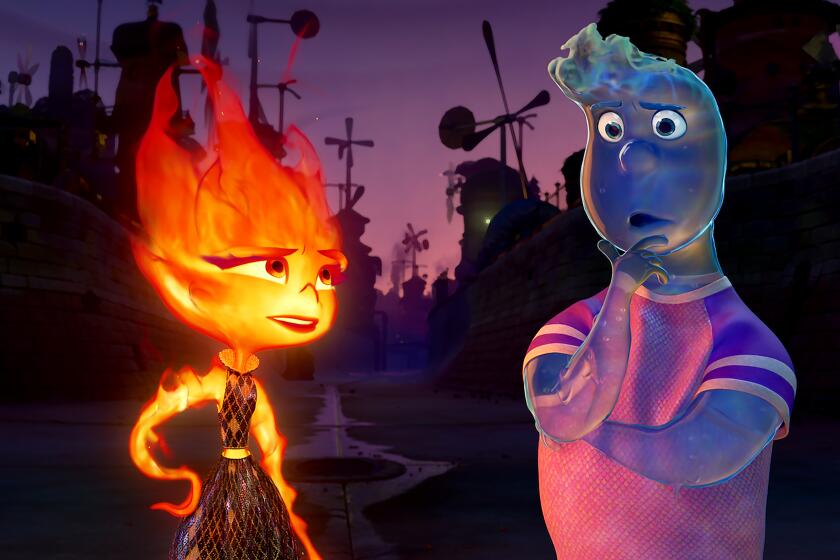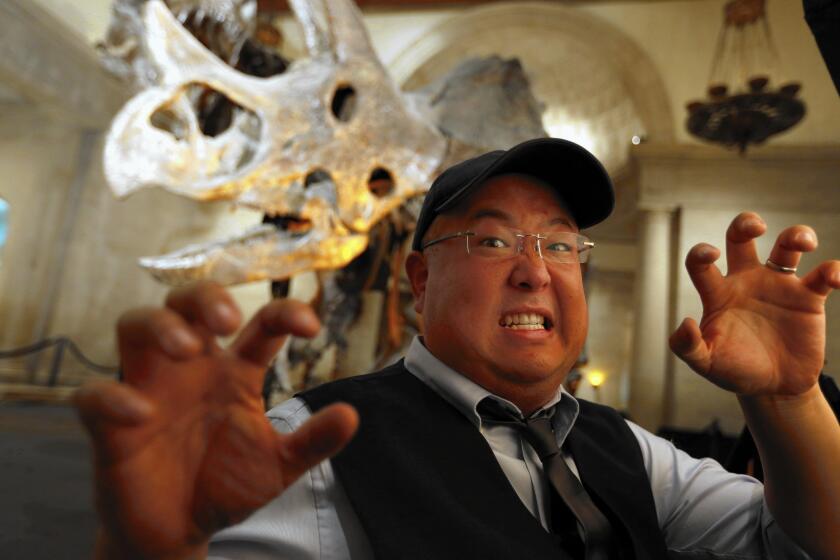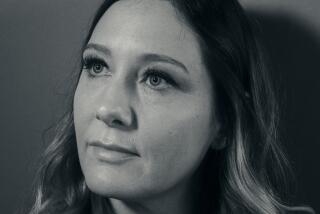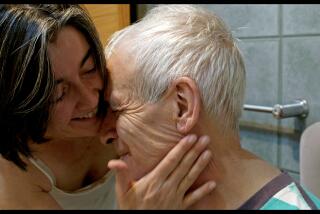‘Elemental’ is a reminder to thank our parents while we still can
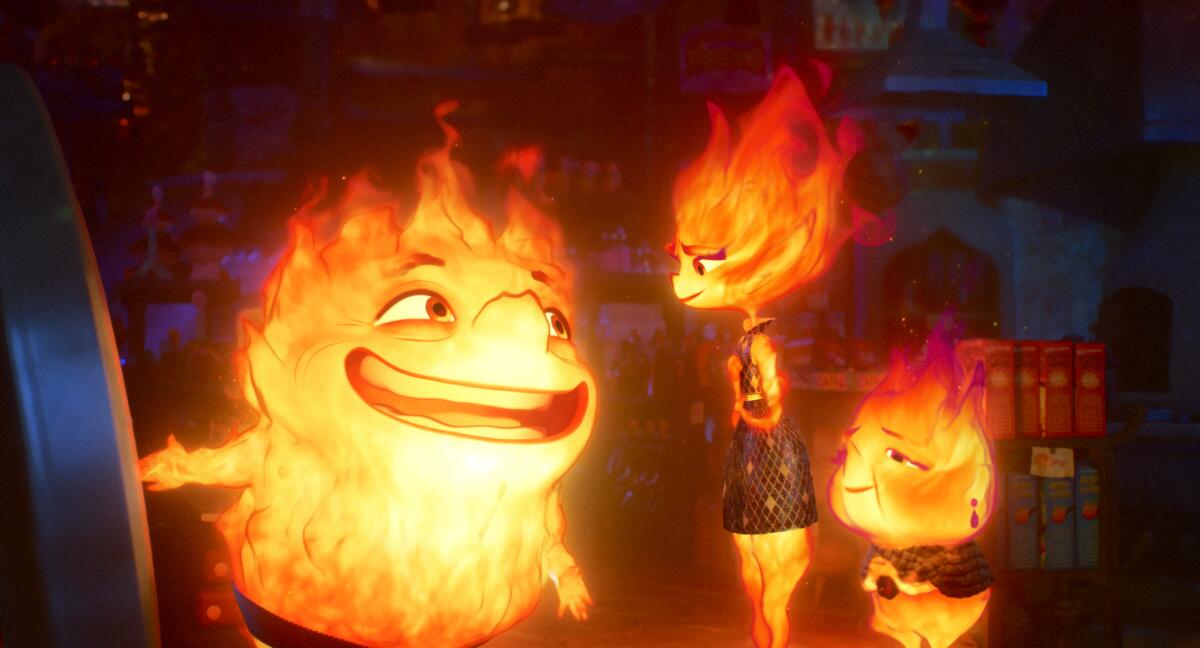
- Share via
How do you convey how thankful you are for everything your parents have done for you?
That’s one of the key dilemmas Ember (voiced by Leah Lewis) has to navigate in Pixar’s “Elemental,” out now in theaters (although box office reports suggest audiences may be waiting for its arrival on Disney+). A young fire woman who grew up in the shop her parents built after leaving their homeland, Ember has always assumed she would take over the business so her father can finally retire.
At least, that’s what she always dreamed. But after a chance encounter with Wade (Mamoudou Athie) — a water guy who’s very in tune with his emotions — she’s forced to realize that she’s never taken the time to really be honest with herself, because it’s a luxury she never thought she had. Ember’s focus has always been on being a “good daughter” to her parents who left everything and everyone they knew behind to seek better opportunities in a strange new land.
It’s a familiar dynamic for those with immigrant parents, but Ember’s story is relatable to anybody who grew up knowing their parents worked hard and made sacrifices just to give their kids a shot.
Following the familiar “Romeo and Juliet” template, the latest movie from Pixar Animation puts a new spin on a tale of opposites attracting.
For director Peter Sohn, “Elemental” is a deeply personal story. While he can trace his inspiration for the animated movie’s whimsical premise — different elements living as neighbors — to the periodic table he first saw in science class, the heart of Ember’s story came from Sohn’s experiences as a child born and raised in New York’s Bronx to Korean immigrant parents, as well as his interracial marriage.
During a recent video call, Sohn recounted the time he was onstage waiting to make remarks at an event celebrating Pixar (his feature directorial debut, “The Good Dinosaur,” was also for the studio). Seeing his family’s faces in the audience, he was suddenly struck by how thankful he was, so he scrapped his planned speech and talked about them instead.
“It got very emotional,” said Sohn. “I cried up there. It was embarrassing. Someone in the background was like, ‘You better thank them!’ I came back to Pixar with that story and some of the folks here said, ‘Hey, that’s your next film.’ ”
That feeling of gratitude permeates “Elemental.”
Sharing intimate family stories isn’t easy. Even Sohn admitted he had difficulty being “so vulnerable about personal stuff” and that it was a couple of years into the production before he saw these elements as more than just ingredients for the movie, and really leaned in.
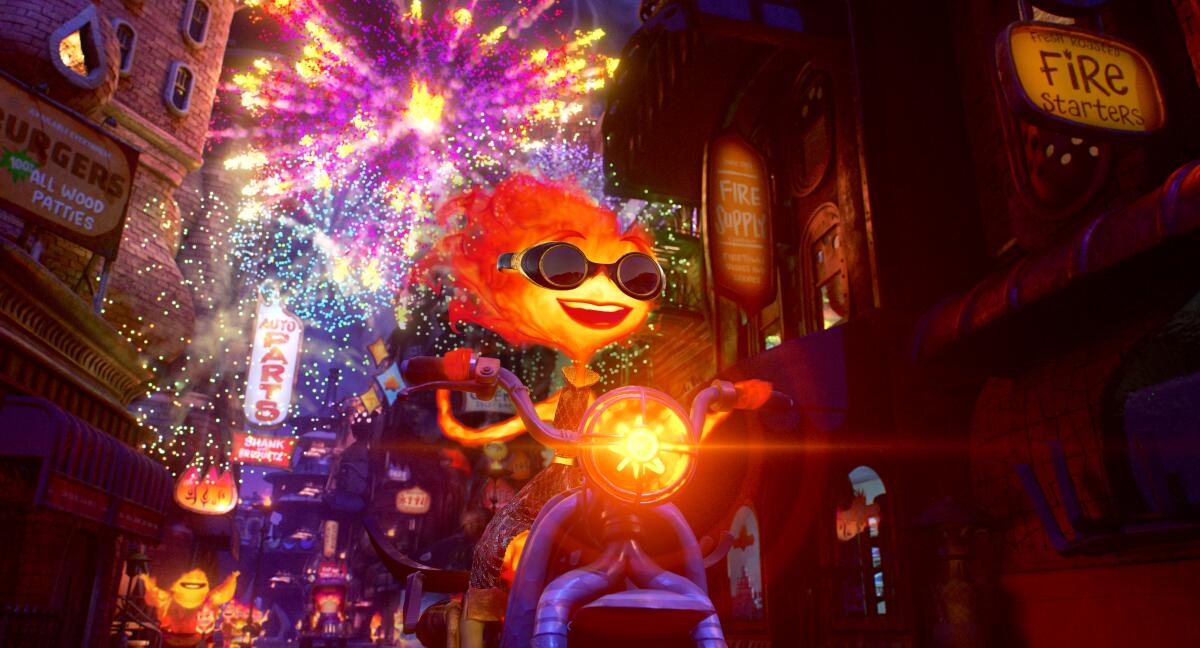
Adding to that is the loss Sohn experienced in the years it took to make “Elemental.” Sohn’s father died early during the production, and his mother died a few years later. He wanted to honor them with this movie, he said, but pouring his grief into his work took the film to a much darker place than he intended.
“I had to wrestle with a lot of these issues of grief,” said Sohn. He said he “grab[bed] on to this guiding light, this North Star of just wanting to thank the people in our lives that have sacrificed or taken risks for us. It became this saddle that I held on to.”
It’s these tiny flecks of grief that tinge “Elemental’s” message that really resonated with me as a viewer — and in a different way than recent films about the relationships between Asian mothers and their daughters.
Ember struggles with the idea of being honest with her family because she doesn’t want to let them down. What goes unmentioned is that when you are keenly aware you’re an outsider — in Ember’s case, a fire woman living in a world not built for fire people — it’s that much harder to risk any disapproval from those who have provided the one place where you feel you do belong.
Wade, the water guy, whose father died before the events of the movie, reminds Ember that her parents won’t be around forever and that it’s important to be honest with them while she can.
On a sleepy afternoon at the Natural History Museum of Los Angeles County in early November, Peter Sohn sprang from his seat and started acting out a scene from “Lawrence of Arabia.”
My father died when I was 22 while I was off chasing what I thought were my dreams. Until then, I was lucky enough that I never really had to consider my parents’ mortality and took for granted that they would be around forever. I was nowhere near mature enough to have really considered who my dad was outside of being my dad.
As the years passed, the more I’ve thought about the conversations we didn’t have and the sides of me he’d never see. We spent a lot of time together, but since I inherited his tendency to express love through action (he always found a way to let me pursue any interest I expressed), I sometimes wonder if that was enough.
More than any lingering ache I feel that my dad never really got a chance to know the real me — I didn’t even know the real me at 22 — is the fear that he died without really hearing my thanks. Did I say it loud enough, if I didn’t always use my words?
How do you convey how appreciative you are for everything your father has done for you when he’s no longer around for you to tell him?
“Elemental” offers one answer. After Ember finally tells her father about her new dream of pursuing the arts, she realizes that all her parents have really wanted for her is to be able to pursue happiness, even if it’s something (or with someone) they hadn’t ever considered before.
Many of us get to chase ambitions that our parents never had the luxury of imagining — such as making a living watching and writing about animated movies. One way to show them our thanks might be to keep dreaming big. But the film’s biggest takeaway is to always say thank you while you can.
More to Read
Only good movies
Get the Indie Focus newsletter, Mark Olsen's weekly guide to the world of cinema.
You may occasionally receive promotional content from the Los Angeles Times.
